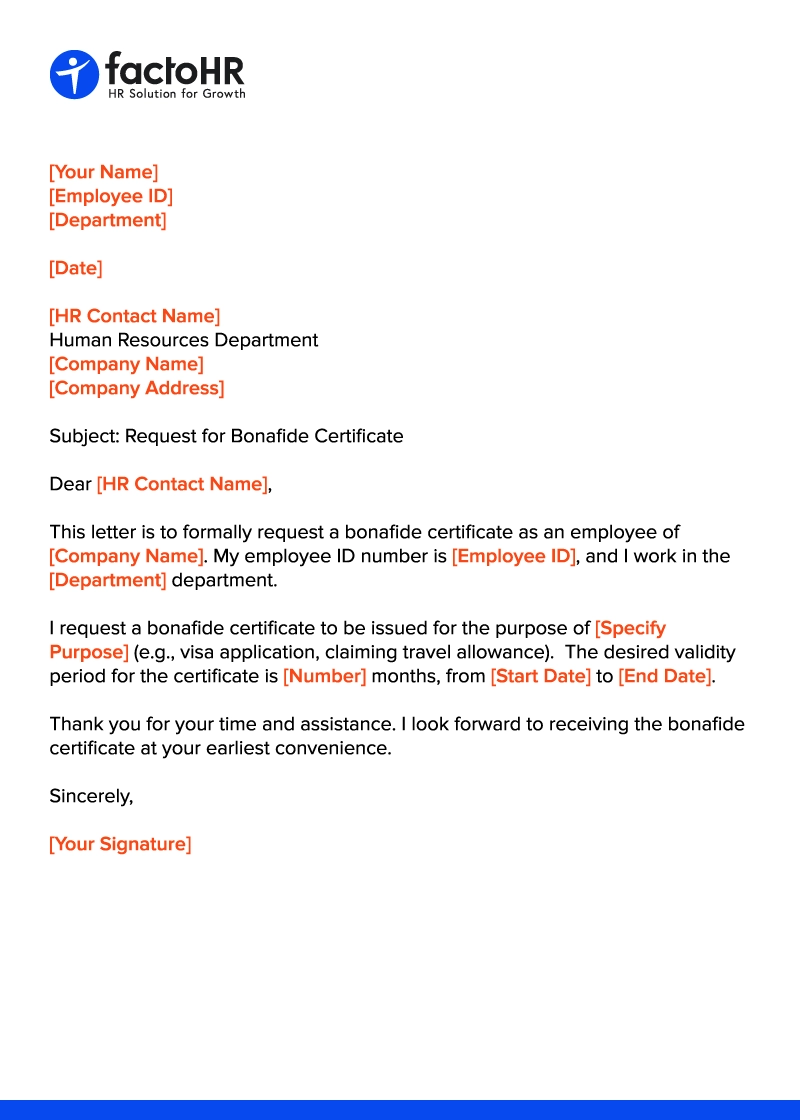Bonafide Certificate: Format, Application, and Sample

Download Bonafide Certificate Word Format For Free
Table of Contents
You’ve probably encountered the term “bona fide” before, but what exactly does it mean? The term “bona fide” comes from Latin and translates to “in good faith,” indicating authenticity. A bona fide certificate is an official document an institution or organization provides to verify a person’s genuine affiliation with them.
What is a Bonafide Certificate?
Bonafide certificates hold significant value in various situations. They act as official proof that an individual is a bona fide student enrolled in a specific program at an educational institution or a bona fide employee working for a particular company. Beyond these two primary types, the certificate can be issued for multiple purposes, catering to specific needs. Whether it’s to apply for a visa, secure a scholarship, or obtain a concessionary benefit, a bona fide certificate can be a crucial piece of documentation.
Purpose of Bonafide Certificate
While it establishes a person’s legitimate affiliation with an institution, it’s important to distinguish it from other documents with similar-sounding names. Character certificates, for instance, focus on an individual’s conduct and behavior while associating with a particular organization. Enrollment proofs, on the other hand, confirm a student’s registration in a specific program or course.
These certificates, however, encompass a broader scope. “They are frequently requested for various situations.”
- Educational Purposes: Students might need it to apply for scholarships, attend conferences or workshops, apply for transfer to another institution, or secure hostel accommodation.
- Employment Purposes: Employees may require it for visa applications, claiming travel allowances, or applying for loans.
- Other Purposes: These certificates can be helpful when opening bank accounts, claiming residential benefits, or participating in government programs where proof of affiliation is necessary.
The certificate is generally considered legally valid within the specific context for which it is issued. However, it may not be universally recognized as a legal document. Additional verification or notarization might be necessary for official purposes outside the institution that issued it.
The information typically included in it ensures clarity and purpose. It usually contains details about the recipient (name, Date of birth), association with the issuing institution (student ID, employee designation, program/department), the certificate’s purpose, and a validity period specifying how long the information remains accurate.

Types of Bonafide Certificates
While the core information remains consistent (recipient details, association details, purpose, validity), there can be variations in the specific type depending on the context. Here are a few examples:
- Student: This verifies a student’s enrollment in a specific program at an educational institution.
- Employee: This confirms an individual’s employment status with a company, including their designation and department.
- Residential: Local authorities can issue this to verify a person’s residence in a particular area.
- Dependant: This might be required to prove a person’s dependent status for visa applications or benefits claims.
Obtaining a Bonafide Certificate
The process of acquiring a certificate differs slightly depending on whether you’re a student or an employee.
For Students
The issuing authority for a student’s certificate is their educational institution – the school, college, or university they attend. The typical application process involves a written request submitted to the appropriate department, often the administrative or registrar’s offices. This request can be a formal letter or a completed application form provided by the institution. Required documents might include a photocopy of your student ID card and proof of fee payment.
In your request letter, it’s crucial to clearly state your details (name, student ID, program enrolled in), the purpose for needing the certificate (scholarship application, visa application, etc.), and the desired validity period. Some institutions might require additional documents depending on the specific purpose of the certificate.
For Employees
The issuing authority for an employee’s certificate is their employer’s Human Resources (HR) department. The application process typically involves submitting an internal request form provided by the HR department. This form will likely request basic information like your name, employee ID, and designation. The purpose for needing the certificate is also usually required on the form.
While a formal written request might not be necessary for employees, clearly communicating the purpose of the certificate helps the HR department process your request efficiently.
The turnaround time for issuing it can vary depending on the institution or organization. Generally, it can range from a few days to a week, although some institutions might take longer for verification purposes. It’s always best to inquire about the expected processing time when you submit your request.
Why a Bonafide Certificate is Important
It holds significant weight in a variety of situations. Here’s why they are considered important:
Verification of Identity and Affiliation
These certificates act as official proof that an individual is genuinely associated with a particular institution. They verify a student’s enrollment in an educational program or confirm an employee’s current employment status with a company.
Facilitates Various Processes
It is often an essential document required for numerous applications and procedures. They can be crucial for securing scholarships, applying for visas or travel concessions, opening bank accounts, claiming residential benefits, or participating in government programs that require proof of affiliation.
Streamlines Processes
It helps streamline various processes by providing official verification of a person’s status. This reduces the need for institutions and organizations to conduct their own verification checks, saving time and resources for everyone involved.
Supports Transparency and Trust
The issuance of certificates promotes transparency and trust within a system. They provide a reliable document format for individuals to demonstrate their bonafide association with an institution, fostering confidence in the legitimacy of applications and claims.
In essence, it acts as a bridge between individuals and institutions, fostering a smooth flow of information and verification in various contexts.

Required Documents for Application
The type of documents required for a certificate varies depending on the purpose of the certificate. Here are some general documents required:
- Photocopy of Your ID: This could be your student ID card for students or a government-issued ID like a passport or driver’s license for employees.
- Application Form: Organisations might have a specific form for requesting the certificate.
- Proof of Fee Payment: If there’s a processing fee associated with obtaining the certificate, a receipt for the payment might be required.
Application for Bonafide Certificate Format

Bonafide Certificate Sample
[Institution Name]
[Institution Address]
Bonafide Certificate
This is to certify that [Full Name of Recipient] (born on [Date of Birth]) is a bonafide [Employee] enrolled in the [Department Name] at [Institution Name]. The employee ID number is [Employee ID].
[Recipient Name] has been employed since [Start Date].
This certificate is issued for the purpose of [Purpose of Certificate] and is valid from [Start Date] to [End Date].
Issued on this [Date]
[Authorized Signature]
[Designation]
Additional Considerations
While certificates play a crucial role in various situations, ensuring their authenticity is vital before relying on them. Institutions and organizations should have a verification process to confirm a certificate’s validity. This might involve contacting the issuing institution directly or checking for security features like seals or watermarks.
The consequences of using a fake or forged certificate can be severe. Depending on the context, it could lead to the rejection of applications, visa denials, or even legal repercussions. It’s always best to obtain a it through the proper channels to avoid such complications.
It’s important to note that there might be regional variations in the format or issuance process for a certificate. While the core information typically remains consistent (recipient details, association details, purpose, validity), specific requirements or procedures could differ based on location. If you’re unsure about the process in your region, it’s advisable to contact the issuing institution directly for clarification.
Conclusion
Bonafide certificates are valuable documents verifying a person’s legitimate affiliation with an educational institution or organization. They play a crucial role in various scenarios, from securing scholarships and visas to claiming benefits and applying for loans. Understanding the purpose, types, and process of obtaining a bona fide certificate ensures its effective utilization. Contacting the issuing institution directly is always recommended for further information on specific requirements or regional variations.

Frequently Asked Questions
Define Bonafide Certificate?
It is a formal document issued by an institution or organization to verify a person’s genuine association with them. It is official proof that someone is a bona fide student enrolled in a program or a bona fide employee working for a company.
What are Some Common Uses of Bonafide Certificates?
It’s uses include:
Educational Purposes: Scholarship applications, attending conferences, applying for transfer to another institution, securing hostel accommodation.
Employment Purposes: Visa applications, claiming travel allowances, applying for loans.
Other Purposes: Opening bank accounts, claiming residential benefits, participating in government programs.
How Do I Obtain a Bonafide Certificate?
The process differs slightly depending on whether you’re a student or an employee.
Students: Contact your school, college, or university’s administrative or registrar’s office. Submit a written request or completed application form and any required documents (e.g., student ID photocopy, fee payment proof). Clearly state your details, the purpose of needing the certificate, and your desired validity period.
Employees: Contact your employer’s Human Resources (HR) department. Submit an internal request form with your basic information (name, employee ID, designation) and the purpose for needing the certificate.
What Information is Typically Included in a Bonafide Certificate?
- Recipient details (name, Date of birth)
- Association details (student ID/employee designation, program/department)
- Purpose of the certificate
- Validity period
How Long Does It Take to Get this Certificate?
The turnaround time can vary depending on the institution or organization but generally ranges from a few days to a week.

Modernize your HR tasks with factoHR today
Experience the digitalization of everyday business activities with factoHR's modern and compatible solutions for every need.

© 2026 Copyright factoHR


